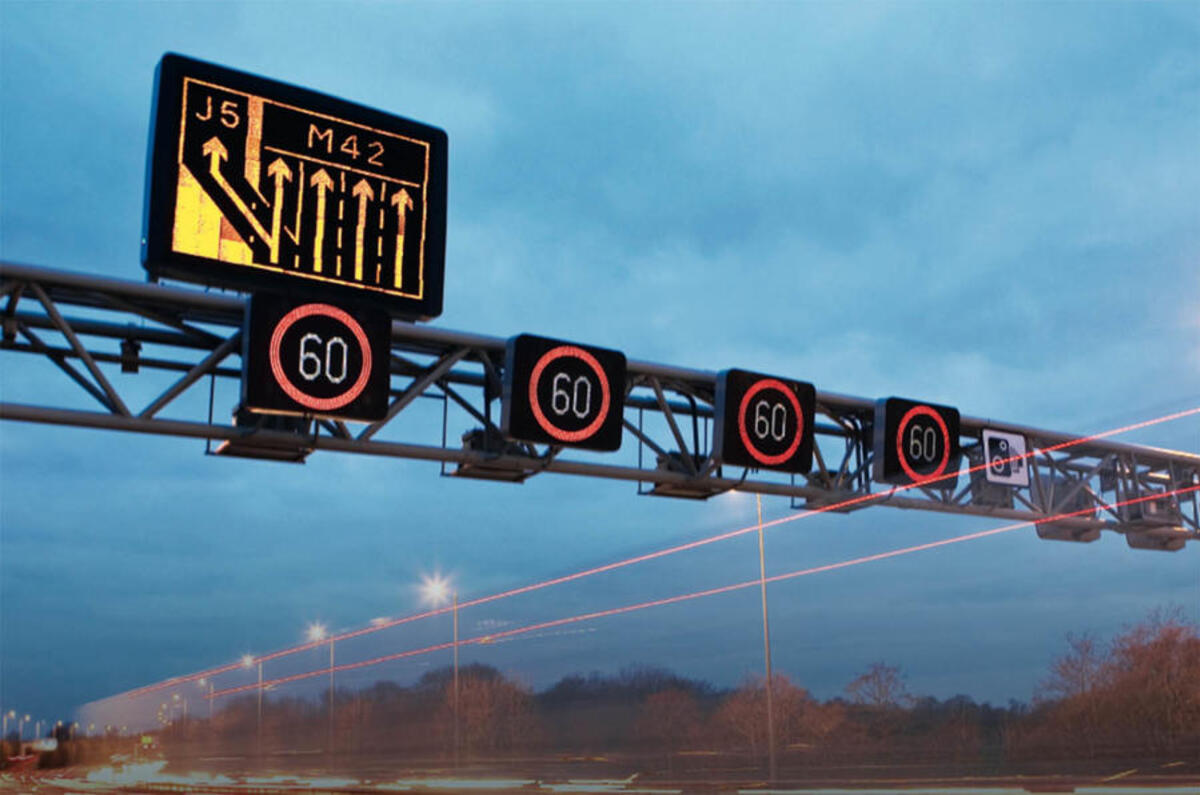A record number of speeding fines accrued on sections of motorway with variable speed limits could suggest the limits are confusing motorists.
An investigation by The Times showed that more than 70,000 drivers were fined on motorways with variable speed limits last year. This tenfold increase compared with five years ago has led to suggestions that variable speed limits are unfairly operated.
Highways England, which operates the country’s motorway network, pre-emptively enforces lowered speed limits before congestion builds up. But a spokesman for the AA told Autocar that such a system is creating “distrust” and encourages speeding.
“It’s not surprising that drivers who see the ‘congestion ahead’ message but are the only car on the motorway don’t trust the lowered speed limit,” said the spokesman. “It’s because they’re unaware of how the system works. But, in their defence, how would they know?”
The UK’s smart motorway system uses radar technology so it can detect traffic levels on the road. If traffic builds up at a certain section, the system slows down approaching cars so that by the time they reach the point, it’s cleared or at least freer-moving.
Do we really want more smart motorways?
But the AA has asked Highways England to provide more information as to how quickly the system can react to changes because, as the spokesman explained, “there could be a delay that leaves lowered limits in place” even after congestion has cleared.
“Let’s have a review in the radar system,” the spokesman said. “Is there a time lag, has it been left on for an hour after that congestion has ended? We argue that if traffic is now free, let it flow.”
Variable speed limits are often enforced on smart motorways, where hard shoulder running is allowed during high traffic. But research obtained by the AA shows that many drivers are opting not to use the hard shoulder, which is labelled as Lane 1 on gantry signage, possibly because they are unsure if they can.
“Even Highways England has said that drivers aren’t using Lane 1 as much as they could be,” said the spokesman. “So if the smart motorway system is flawed, how does that tie in with Highways England’s ambition to introduce more of them?”
Ongoing upgrades to the M4 motorway have also brought safety into the spotlight, following Highways England’s decision not to increase the number of emergency rest areas, despite a recent agreement with parliament.
Highways England said the upgrade, which will cover 32 miles between junction 3 (Hayes) and 12 (Theale) in a five-year project costing up to £862 million and due to finish in 2022, is already under way and so can’t be changed in this way.
More content:
German-built Skoda Karoq to hit market while brand upgrades Czech plant




Join the debate
Add your comment
Highways England and the Government are (as is usual for modern ideals) over thinking a simple problem. Making everyone do a 90 mintue driving test once every 5 years will solve ALL problems on the road today but that's not what they want is it. They want to earn from our misery as always!
M42 is not Smart
This is from the horses mouth so to speak, that is Highways Agency staff in control of the upgrading to smart motorways. The M42 is a managed motorway, that is because it is only a part time 4 land running motorway, the hard shoulder is only open at busy times or should I just say peak because if ever you happen to find the M42 not as busy as ususal (rare I know but it does happen from time to time) it seems the speed restrictions are still activated. Travelling at 50mph on the hard shoulder, open because it is "busy" when you are the only car for over 100m is extremely boring and probably more dangerous than travelling at 70 with traffic, or perhaps my concentration is just poor crawling along with barely anyone else around me.
Also whether on a managed motorway or a smart motorway I think it is more dangerous with the ever changing speeds and everyone breaking to avoid speeding, especially when it drops from 50mph to 30mph just as you're all approching the gantry. Unfortunately I know more about smart motorways than I ever wished (long story) and I personally don't think they improve traffic flow, I believe it is just a money spinner, dangerous because people don't know how to use them and because there is nowhere to go in a breakdown if you are not near to an era. We have had a family clamber up the bank and into our garden leaving their car in the nearside lane and who can blame them. A minor collision can cause endless tailbacks as the whole roads gets blocked very easily with no easy route through for the breakdown/emergency services. And the most annoying aspect of all is having to go to the 4th lane to overtake 3 lorries all trying to pass each other.
A bit of big brother"...?
Why not make Motorways autonomous?, take the biological interface out of the equation?, you join the Motorway the tech takes over sets the safe speed and distance changes when it needs to, and when you indicate to leave your given control back....?
WIth about 26 million cars on
WIth about 26 million cars on UK roads, we're not going to be there for a little while yet. And in my opinion, neither should we be.
With the national deficit, national debt, and with wages having fallen behind inflation, property & household fuel prices so much in the last 10-20 years...
...Why Not stop spending billions of public money on endless meddling with technology that isn't vital to our existence, balance the nation's accounts, tax us less, and let us get on with our lives in peace... ? Without being under constant surveillance & instructions from ill-programmed machines....